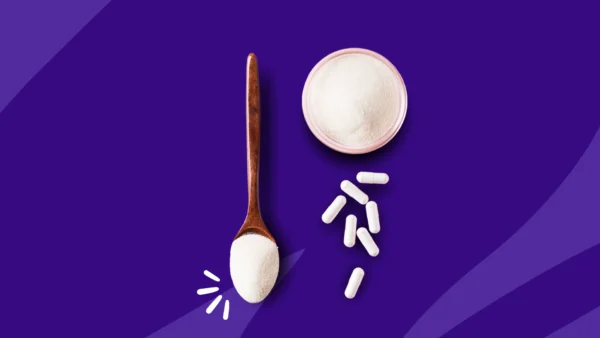We’ve all been there: You have a nagging cough that just won’t go away. Not only is your chest and throat aching, but you’re unable to get a good night’s sleep. If over-the-counter cough medicine isn’t helping, you may search for other options. That’s where home remedies come in. You’ve likely heard the old wives’ tales, but it turns out that some of these home remedies actually work.
10 home remedies for a cough
Because they’re free and easy to access, it’s no wonder people turn to natural cough remedies before trying medications or seeking medical help. “[Home remedies] provide comfort for patients who are sick and are generally readily available,” says Gregory Castelli, Pharm.D., the director of academic and clinical pharmacy at the University of Pittsburgh in Pittsburgh, Pennsylvania.
Some common home remedies for cough include:
- Honey
- Marshmallow root
- Ginger
- Licorice root
- Thyme
- Peppermint
- Eucalyptus
- Turmeric
- Humidifier or air purifier
- Saltwater gargle
1. Honey
Honey is often recommended as a traditional remedy for cough. According to the World Health Organization, honey is cheap, accessible, and safe to relieve coughs associated with upper respiratory tract infections in children. It can also reduce the severity and duration of cough.
“There are a few studies that show that honey decreases coughing and is a safe option,” says Dean Blumberg, MD, the chief of pediatric infectious diseases at UC Davis Children’s Hospital in Sacramento, California. You can mix honey with hot milk, warm lemon water, or tea to relieve coughing. Or, try taking one spoonful of plain honey on an empty stomach to soothe your throat and reduce coughs. Honey should not be given to children younger than 1.
Of note, some studies have shown honey is not as effective as the over-the-counter medication dextromethorphan for cough.
2. Marshmallow root
Marshmallow root is an herb that contains a gummy substance called mucilage, which is found in the root and leaves of the plant. It forms a protective coating on your mucous membranes that reduces irritation and cough. A limited German study, utilizing surveys and without a placebo control, reported marshmallow root to be effective in treating pharyngeal irritation and associated cough. You can take marshmallow root as a lozenge or a syrup. More research is needed to confirm that marshmallow root is effective at treating cough because many of the existing studies are very small.
3. Ginger
Ginger is a plant with antimicrobial and anti-inflammatory properties that has been used to relieve coughs and colds. Ginger can also be used against allergic rhinitis and other respiratory issues. You can either boil ginger in water or make ginger tea and drink it three to four times a day or chew fresh raw ginger to reduce a cough. Evidence of effectiveness is limited.
4. Licorice root
Licorice is an herb that contains a number of compounds that fight inflammation and bacteria and boost the immune system, such as polysaccharides, flavonoids, and triterpenes. Licorice root may help to reduce coughs and prevent asthma symptoms. It can also reduce post-operative sore throat and intubation-associated cough. Licorice root can be found in many herbal teas and as a syrup.
5. Thyme
Thyme is an herb that could help to relieve your cough and reduce airway inflammation. Studies also report that thyme, in combination with primrose and English ivy, can significantly improve a cough and other symptoms of bronchitis. Thyme works best for a cough when you boil it in water, strain it, and then drink the liquid.
6. Peppermint
Research suggests peppermint oil may be effective in reducing cough and cold symptoms. Peppermint oil has three main components that can reduce a cough: menthol, flavonoids, and menthone. You can dilute peppermint oil in warm water and breathe in the steam or drink peppermint tea.
7. Eucalyptus
Eucalyptus oil can be useful in improving coughs and symptoms of other upper respiratory tract infections because it is a natural expectorant that can help to loosen mucus. You can inhale the steam of eucalyptus oil diluted in warm water up to three times per day. Eucalyptus oil may also be infused in ointments for direct application on the nose and chest. However, you should not administer eucalyptus oil to children in any form.
8. Turmeric
Turmeric containing curcumin has antimicrobial, anti-inflammatory, antioxidant, and anticancer properties that can help to reduce a dry cough. You should mix turmeric with black pepper to increase absorption, then you can add it to food as a seasoning or into a glass of warm milk.
9. Use of humidifier or air purifier
Humidifiers help to increase moisture in the air, which simultaneously reduces dry air—something that can irritate airways. “Some coughs get worse when the humidity decreases, for example, at night when it is colder,” Dr. Blumberg says. “If that is the case, then vaporizers or humidifiers may decrease coughing.”
Additionally, an air purifier could help with a cough if it’s caused by indoor air irritants, according to Spyridon Fortis, MD, a pulmonologist at the University of Iowa Hospitals & Clinics in Coralville, Iowa.
Both humidifiers and air purifiers “should be cleaned periodically and used according to the manufacturer’s specifications,” Dr. Fortis says.
10. Saltwater gargle
Gargling with warm salt water can reduce irritation in the airways and improve coughs. It also helps block bacteria and viruses from moving from your throat into your lungs. You can mix a teaspoon of salt in eight ounces of warm water for gargling. After you gargle, spit the water out and repeat this process several times a day.
Cough remedies that don’t work
Although there are home remedies that will help, there are also those that won’t. Some lack research and could even cause more harm than good. These include:
- Bromelain: This enzyme, found in pineapple, may be recommended for a cough, but research on bromelain is quite scarce. Moreover, people taking blood thinning medications should avoid it.
- Hot fluids: It’s an old wives’ tale that hot liquids such as soups can soothe airway irritation. In reality, any soothing feeling could be a placebo effect rather than actual healing.
- Zinc lozenges: High doses of zinc can cause a few unpleasant side effects, such as nausea, dizziness, loss of appetite, and headaches. Meanwhile, their benefits for cough have yet to be fully proven. Additionally, zinc lozenges are not suitable for breastfeeding or pregnant women.
When to see a doctor for a cough
There are many illnesses that cause a cough—such as the common cold, bronchitis, asthma, pneumonia, and allergic rhinitis, among others. Most coughs will resolve on their own in three weeks. If yours lasts longer, you may want to see a healthcare provider or pulmonologist for medical advice and treatment. You should seek immediate medical attention if you have any of the following symptoms:
- Coughing up mucus containing blood
- High fever
- Difficulty breathing
- Difficulty swallowing food or talking
- Wheezing
- Chest pain
Your healthcare provider may ask detailed questions about your symptoms and medical history to diagnose the underlying cause of the cough or run specific tests such as chest X-ray, sputum culture, blood tests, or CT scan. Depending on the source of your cough, your provider may recommend medications, including:
- Cough suppressants: Cough suppressants, also termed antitussives, such as dextromethorphan, help to reduce the duration and severity of coughs.
- Nasal decongestants: These can clear the accumulation of mucus or phlegm at the back of the throat (postnasal drip), which may be the cause of cough, thereby reducing coughs. Examples of nasal decongestants include pseudoephedrine, phenylephrine, and oxymetazoline.
- Antihistamines: These medications also help reduce mucus, relieve postnasal drip, and reduce cough. Examples include diphenhydramine, cetirizine, and loratadine.
- Glucocorticoids: These asthma medications may be effective in cases where the cough develops due to an underlying health condition. Examples include prednisone and prednisolone.
Sources
- Cough and cold remedies for the treatment of acute respiratory infections in young children, World Health Organization (2001)
- Natural remedies for acute post-viral cough in children, Allergologia et Immunopathologia (2021)
- Marshmallow Root Extract for the Treatment of Irritative Cough: Two Surveys on Users’ View on Effectiveness and Tolerability, Complementary Medicine Research (2018)
- Clinical aspects and health benefits of ginger (Zingiber officinale) in both traditional Chinese medicine and modern industry, Acta Agriculturae Scandinavica, Section B — Soil & Plant Science (2019)
- Cough Suppressant Herbal Drugs: A Review, International Journal of Pharmaceutical Science Invention (2016)
- The anti-inflammatory activity of licorice, a widely used Chinese herb, Pharmaceutical Biology (2016)
- Natural products for chronic cough, Chronic Respiratory Disease (2015)
- Curcumin: A Review of Its Effects on Human Health, Foods (2017)
- Do saline water gargling and nasal irrigation confer protection against COVID-19?, EXPLORE (2020)
- The effects of a hot drink on nasal airflow and symptoms of common cold and flu, Rhinology (2008)











